人教版八年级下册 Unit 10 I've had this bike for three years. Section A 1a-1c 课件(共26张PPT)
文档属性
| 名称 | 人教版八年级下册 Unit 10 I've had this bike for three years. Section A 1a-1c 课件(共26张PPT) | 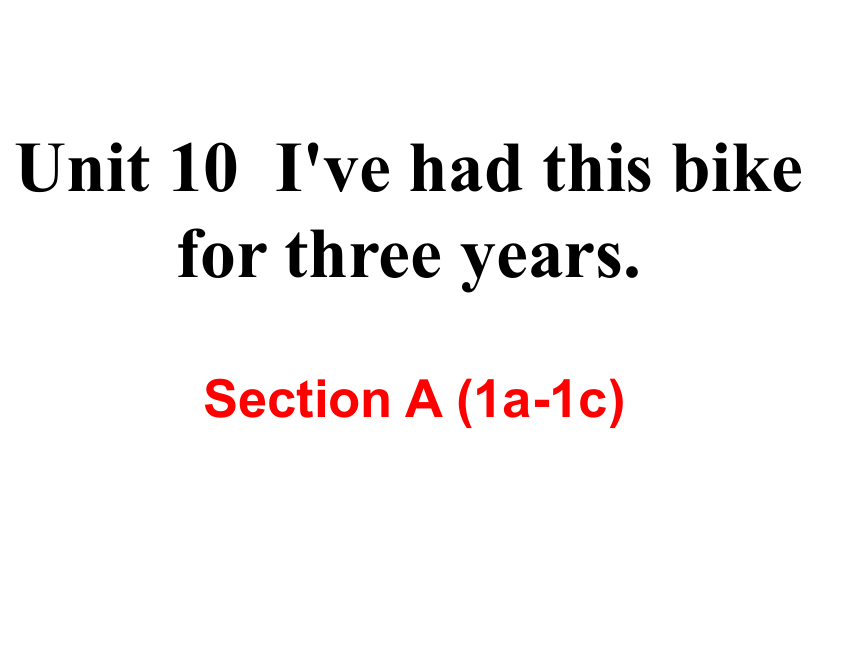 | |
| 格式 | ppt | ||
| 文件大小 | 3.8MB | ||
| 资源类型 | 教案 | ||
| 版本资源 | 人教新目标(Go for it)版 | ||
| 科目 | 英语 | ||
| 更新时间 | 2023-03-14 20:30:35 | ||
图片预览

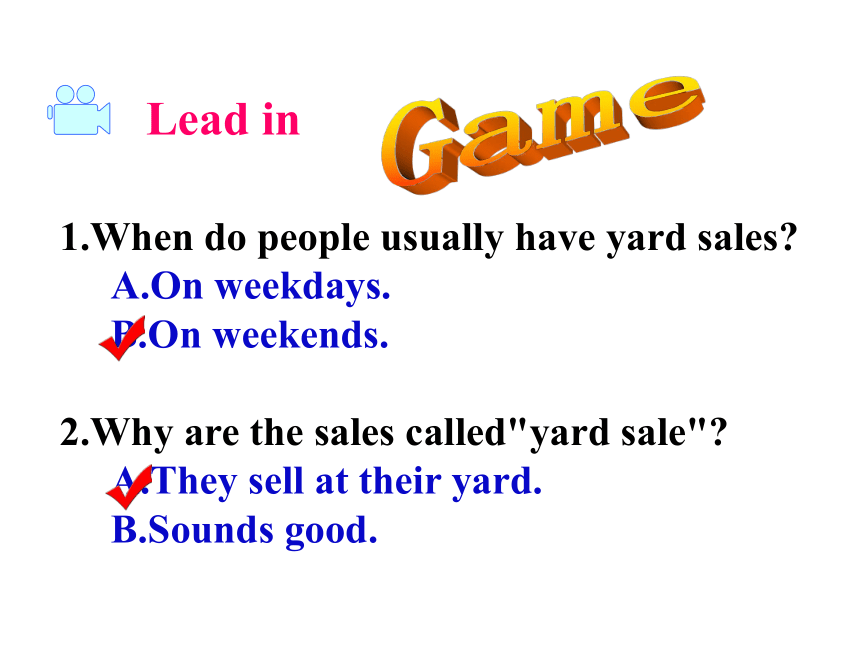
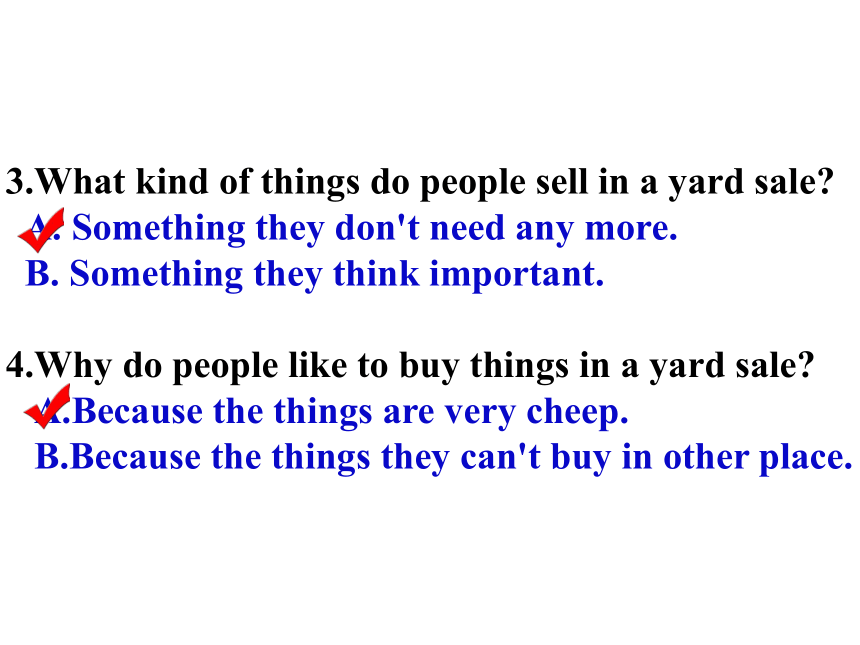
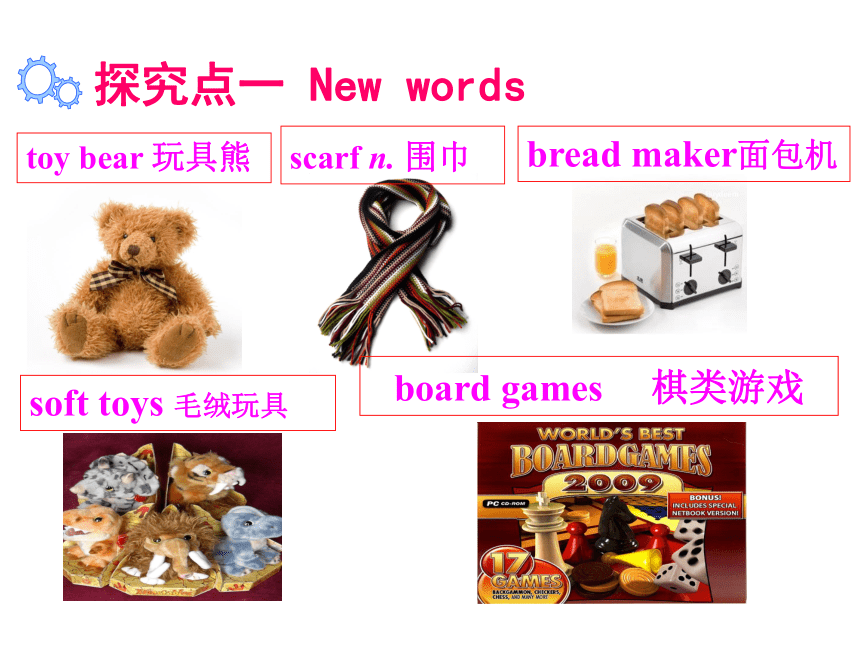
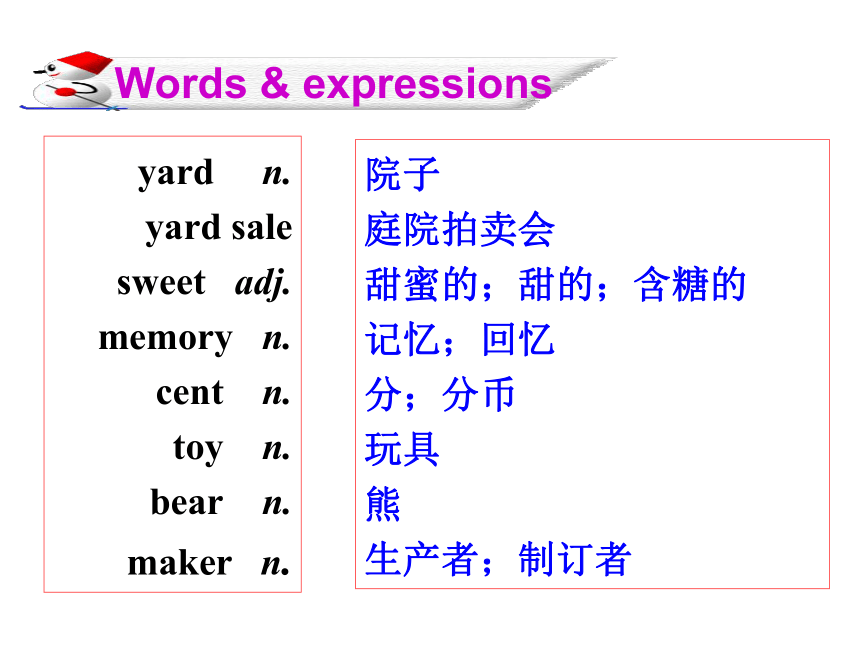
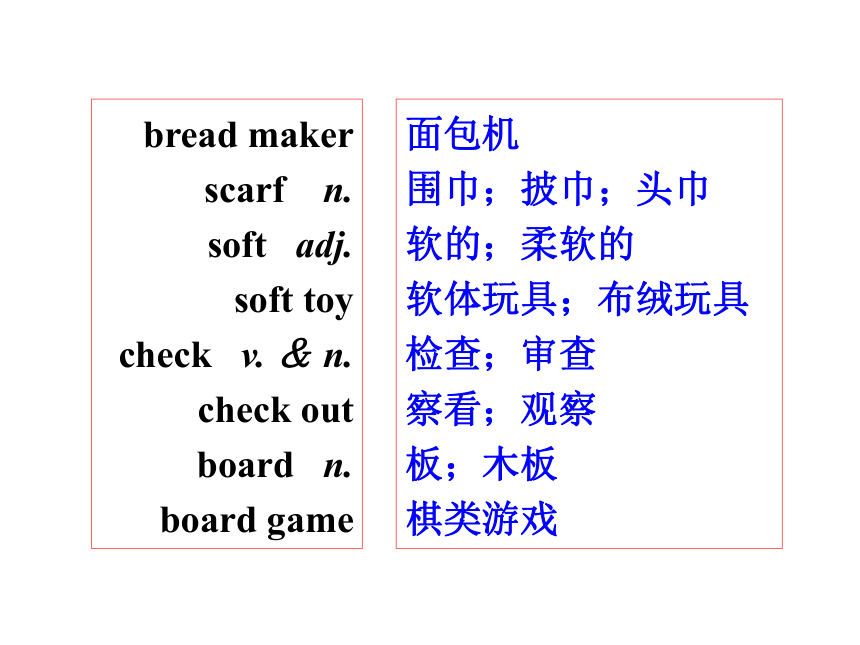
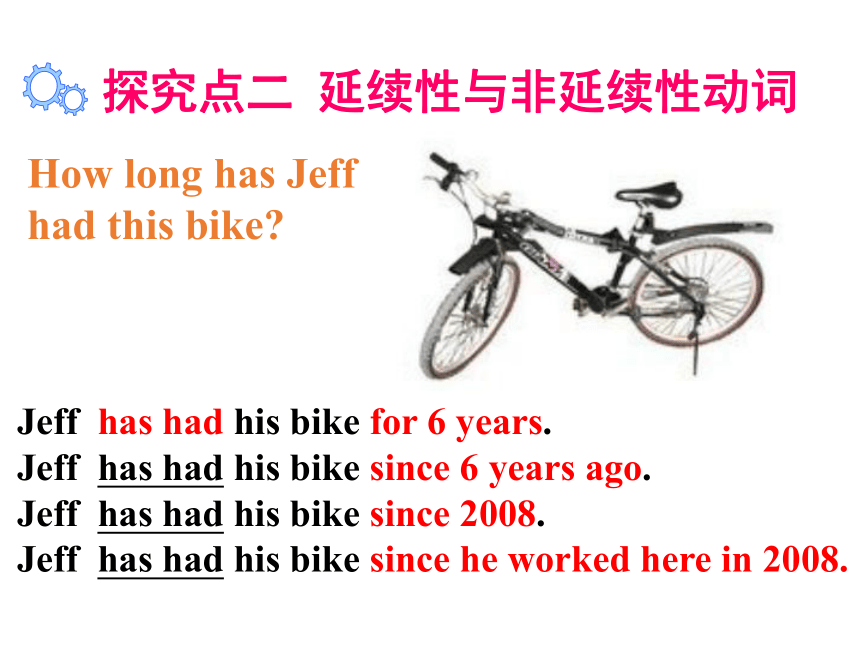
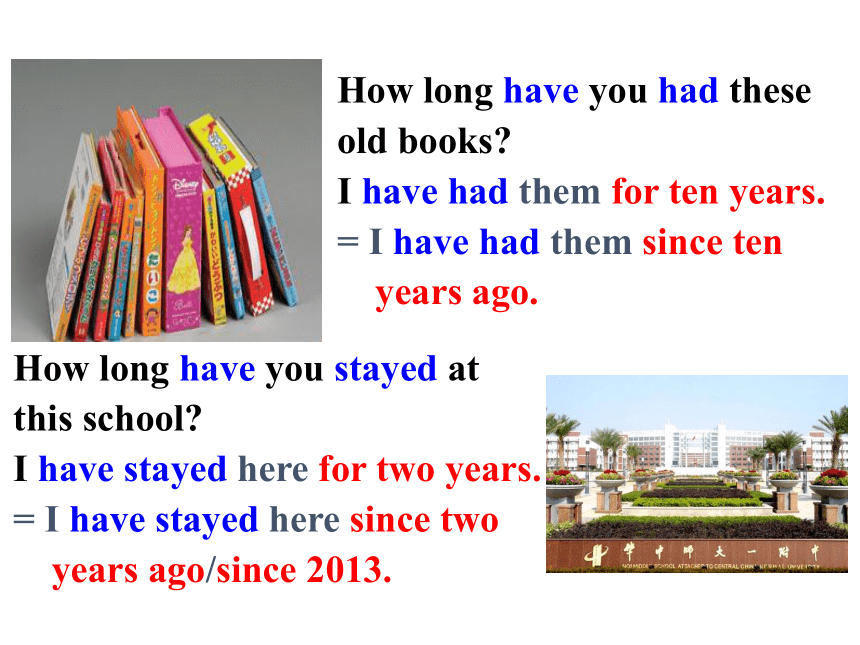
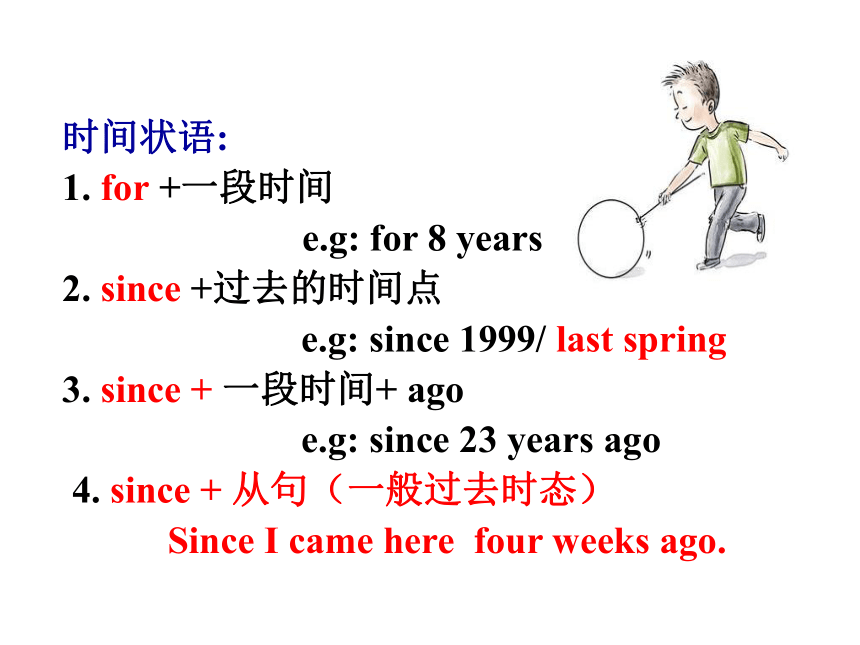
文档简介
(共26张PPT)
Section A (1a-1c)
Unit 10 I've had this bike for three years.
Lead in
1.When do people usually have yard sales
A.On weekdays.
B.On weekends.
2.Why are the sales called"yard sale"
A.They sell at their yard.
B.Sounds good.
3.What kind of things do people sell in a yard sale
A. Something they don't need any more.
B. Something they think important.
4.Why do people like to buy things in a yard sale
A.Because the things are very cheep.
B.Because the things they can't buy in other place.
toy bear 玩具熊
bread maker面包机
scarf n. 围巾
soft toys 毛绒玩具
board games 棋类游戏
探究点一 New words
yard n.
yard sale sweet adj.
memory n.
cent n.
toy n.
bear n.
maker n.
院子
庭院拍卖会
甜蜜的;甜的;含糖的
记忆;回忆
分;分币
玩具
熊
生产者;制订者
Words & expressions
bread maker
scarf n.
soft adj.
soft toy
check v. & n.
check out
board n.
board game
面包机
围巾;披巾;头巾
软的;柔软的
软体玩具;布绒玩具
检查;审查
察看;观察
板;木板
棋类游戏
How long has Jeff
had this bike
Jeff has had his bike for 6 years.
Jeff has had his bike since 6 years ago.
Jeff has had his bike since 2008.
Jeff has had his bike since he worked here in 2008.
探究点二 延续性与非延续性动词
How long have you had these
old books
I have had them for ten years.
= I have had them since ten
years ago.
How long have you stayed at this school
I have stayed here for two years.
= I have stayed here since two
years ago/since 2013.
时间状语:
1. for +一段时间
e.g: for 8 years
2. since +过去的时间点
e.g: since 1999/ last spring
3. since + 一段时间+ ago
e.g: since 23 years ago
4. since + 从句(一般过去时态)
Since I came here four weeks ago.
magazine
Do you have them at home
How long have you had the …
I have had …for …years./since …years ago.
lamp
cap
sweater
1a
What are you going to do with them
yard sale庭院旧货出售
T: What’s this
What are people doing in the pictures
S: It’s a yard sale.
People are having a yard sale.
What’s a yard sale
Why do people have yard sales
Yard sale庭院旧货出售
这是国外的一种风俗,也是一种独特的售货方式。人们利用周末,将家中搁置不用的物件,放在自家庭院中廉价出售,因而被称作yard sale,也可译作“家庭拍卖会”。庭院售卖的物品种类繁多,大到家具,电器,小到玩具,衣物和鞋帽。这些物品虽多数为二手家什,但也有全新的物品,且价格合理公道,
甚至还可讨价还价。正是这种低廉,公道的价格及买家淘宝和碰大运的心理,使得yard sale广受欢迎,逐渐演变成一种独特的文化现象。
how long, how soon, how often, how far
How long 多久, 多长(时间)。对时间段提问, 如: for+时间段;since+过去的时间点。
e.g. --How long have you worked in Beijing
--For five years.
How soon多久以后。对“in+时间段提问, 常用于一般将来时”, 其答语常用“in+时间段”。
1. -- How long have you had that bike there
-- I have had it for three years.
探究点三 Language points
How often 多久一次, 对频率提问, 其答语为:
once (twice/…)+时间段, always, usually 等。
e.g. --How often do you exercise
--Once a day.
How far 多远,对距离提问,其答语是表距离的内容。
e.g. --How far is it from here to your school
--Three kilometers.
e.g. --How soon will Mr. Li be back
--In a week.
2. Jeff’s family is having a yard sale.
3. Amy thinks it’s hard to sell her old things.
艾米认为卖掉她的旧东西很难。
sale名词“出售”on sale“出售”for sale“待售”
e.g. Chickens are on sale in the market.
小鸡在市场上出售。
I’m sorry, it’s not for sale. 抱歉,它不出售。
4. Amy wants to keep her old things because they bring back sweet memories.艾米想保留她的旧东西,因为它们勾起她的甜蜜回忆。
memory 作名词意为“记忆;回忆”,复数形式为memories,动词为memorize,意为“记忆,背诵”。
e.g. She has a good memory. 她记忆力好。
It’s +adj. (+for sb.) to do sth.“(对某人来说)做某是……的”,it 是形式主语,真正主语是后面的动词不定式
e.g. It’s important for us to learn English well.
学好英语对于我们来说是很重要的。
5. It’s hard to say goodbye to certain
things.对某些东西道别是很难的事情。
It is + adj. + to do sth 做某事很 ……
say goodbye to sb 对某人道别
say sorry to sb 对某人道歉
say thanks to sb 对某人道谢
e.g. 我认为跟他道歉不是很难的事情。
I don’t think it is hard to say sorry to him.
6. I learned how to ride a bike on it.
句中“疑问词how + 动词不定式”结构作宾语。该结构中的疑问词还可以用when、what、which等。
Practice
我不知道说什么。
I don’t know what to say.
我们想要学习如何写剧本。
We want to learn how to write plays.
1c
Practice the conversation. Then make conversations about other things in the picture above.
A: This is a really old book.
B: Yes, I’ve had it for seven years. I’ve
read it three times.
A: Why are you selling it
B: Because I don’t read it anymore.
A: How much is it
B: You can have it for 75 cents.
not…any more = not any longer不再,再也(不)
Because I don’t read it anymore.
副词anymore亦可写作any more,常用于否定句的末尾,意思是“再也(不);(不)再”。not … anymore相当于not … any longer。
We don’t live here any more.
= We don’t live here any longer.
我们不再住在这里了。
我再也不想见到你了。
I don't want to see you anymore.
I couldn't trust him anymore.
I just can’t stand this life any more.
1.你拥有那边那辆自行车多长时间了?
2.我已拥有它3年了/自从3年以前我就拥有它了。
3.他的儿子拥有这套及轨道(玩具)多久了?
4.自从他4岁(生日)起就一直拥有它.
How long have you had that bike over there
I’ve had it for three years.
= I’ve had it since three years ago.
How long has his son owned the train
and railway set
He’s owned it since his fourth birthday
= He’s owned it since he was four years old.
1. Because I’ve had it since I was a baby.
since(自从……)常常引导短语或从句,用于现在完成时的句子中。since引出从句时,从句一般使用过去时。
探究点三 Language points
2. The stories inside may be a bit old, …
a bit 意为“一点儿, 稍微”, +形/副词, =a little; a bit of +不可数名词= a little+不可数名词。
There is a bit of/a little water in the bottle.
瓶子里有点儿水。
not a bit =not at all 一点也不
not a little =very 非常
e.g. She is not a bit happy. 她一点儿也不快乐。
He is not a little tired.=He is very tired. 他非常累。
3. I’ve had this magazine for a couple of
months.这本杂志我买了几个月了。
a couple of 其一表具体的数量 “两个”相同的人或物体;其二表数量不定的“少数几个”,具体意思往往视上下文和具体的语境而决定。
I saw a couple of men get out.
我看见有两个人出去了。
She jogs a couple of miles every morning.
她每天早上要慢跑(jog)几英里。
You have to wait for a couple of hours.
你得等上一两个小时。
Section A (1a-1c)
Unit 10 I've had this bike for three years.
Lead in
1.When do people usually have yard sales
A.On weekdays.
B.On weekends.
2.Why are the sales called"yard sale"
A.They sell at their yard.
B.Sounds good.
3.What kind of things do people sell in a yard sale
A. Something they don't need any more.
B. Something they think important.
4.Why do people like to buy things in a yard sale
A.Because the things are very cheep.
B.Because the things they can't buy in other place.
toy bear 玩具熊
bread maker面包机
scarf n. 围巾
soft toys 毛绒玩具
board games 棋类游戏
探究点一 New words
yard n.
yard sale sweet adj.
memory n.
cent n.
toy n.
bear n.
maker n.
院子
庭院拍卖会
甜蜜的;甜的;含糖的
记忆;回忆
分;分币
玩具
熊
生产者;制订者
Words & expressions
bread maker
scarf n.
soft adj.
soft toy
check v. & n.
check out
board n.
board game
面包机
围巾;披巾;头巾
软的;柔软的
软体玩具;布绒玩具
检查;审查
察看;观察
板;木板
棋类游戏
How long has Jeff
had this bike
Jeff has had his bike for 6 years.
Jeff has had his bike since 6 years ago.
Jeff has had his bike since 2008.
Jeff has had his bike since he worked here in 2008.
探究点二 延续性与非延续性动词
How long have you had these
old books
I have had them for ten years.
= I have had them since ten
years ago.
How long have you stayed at this school
I have stayed here for two years.
= I have stayed here since two
years ago/since 2013.
时间状语:
1. for +一段时间
e.g: for 8 years
2. since +过去的时间点
e.g: since 1999/ last spring
3. since + 一段时间+ ago
e.g: since 23 years ago
4. since + 从句(一般过去时态)
Since I came here four weeks ago.
magazine
Do you have them at home
How long have you had the …
I have had …for …years./since …years ago.
lamp
cap
sweater
1a
What are you going to do with them
yard sale庭院旧货出售
T: What’s this
What are people doing in the pictures
S: It’s a yard sale.
People are having a yard sale.
What’s a yard sale
Why do people have yard sales
Yard sale庭院旧货出售
这是国外的一种风俗,也是一种独特的售货方式。人们利用周末,将家中搁置不用的物件,放在自家庭院中廉价出售,因而被称作yard sale,也可译作“家庭拍卖会”。庭院售卖的物品种类繁多,大到家具,电器,小到玩具,衣物和鞋帽。这些物品虽多数为二手家什,但也有全新的物品,且价格合理公道,
甚至还可讨价还价。正是这种低廉,公道的价格及买家淘宝和碰大运的心理,使得yard sale广受欢迎,逐渐演变成一种独特的文化现象。
how long, how soon, how often, how far
How long 多久, 多长(时间)。对时间段提问, 如: for+时间段;since+过去的时间点。
e.g. --How long have you worked in Beijing
--For five years.
How soon多久以后。对“in+时间段提问, 常用于一般将来时”, 其答语常用“in+时间段”。
1. -- How long have you had that bike there
-- I have had it for three years.
探究点三 Language points
How often 多久一次, 对频率提问, 其答语为:
once (twice/…)+时间段, always, usually 等。
e.g. --How often do you exercise
--Once a day.
How far 多远,对距离提问,其答语是表距离的内容。
e.g. --How far is it from here to your school
--Three kilometers.
e.g. --How soon will Mr. Li be back
--In a week.
2. Jeff’s family is having a yard sale.
3. Amy thinks it’s hard to sell her old things.
艾米认为卖掉她的旧东西很难。
sale名词“出售”on sale“出售”for sale“待售”
e.g. Chickens are on sale in the market.
小鸡在市场上出售。
I’m sorry, it’s not for sale. 抱歉,它不出售。
4. Amy wants to keep her old things because they bring back sweet memories.艾米想保留她的旧东西,因为它们勾起她的甜蜜回忆。
memory 作名词意为“记忆;回忆”,复数形式为memories,动词为memorize,意为“记忆,背诵”。
e.g. She has a good memory. 她记忆力好。
It’s +adj. (+for sb.) to do sth.“(对某人来说)做某是……的”,it 是形式主语,真正主语是后面的动词不定式
e.g. It’s important for us to learn English well.
学好英语对于我们来说是很重要的。
5. It’s hard to say goodbye to certain
things.对某些东西道别是很难的事情。
It is + adj. + to do sth 做某事很 ……
say goodbye to sb 对某人道别
say sorry to sb 对某人道歉
say thanks to sb 对某人道谢
e.g. 我认为跟他道歉不是很难的事情。
I don’t think it is hard to say sorry to him.
6. I learned how to ride a bike on it.
句中“疑问词how + 动词不定式”结构作宾语。该结构中的疑问词还可以用when、what、which等。
Practice
我不知道说什么。
I don’t know what to say.
我们想要学习如何写剧本。
We want to learn how to write plays.
1c
Practice the conversation. Then make conversations about other things in the picture above.
A: This is a really old book.
B: Yes, I’ve had it for seven years. I’ve
read it three times.
A: Why are you selling it
B: Because I don’t read it anymore.
A: How much is it
B: You can have it for 75 cents.
not…any more = not any longer不再,再也(不)
Because I don’t read it anymore.
副词anymore亦可写作any more,常用于否定句的末尾,意思是“再也(不);(不)再”。not … anymore相当于not … any longer。
We don’t live here any more.
= We don’t live here any longer.
我们不再住在这里了。
我再也不想见到你了。
I don't want to see you anymore.
I couldn't trust him anymore.
I just can’t stand this life any more.
1.你拥有那边那辆自行车多长时间了?
2.我已拥有它3年了/自从3年以前我就拥有它了。
3.他的儿子拥有这套及轨道(玩具)多久了?
4.自从他4岁(生日)起就一直拥有它.
How long have you had that bike over there
I’ve had it for three years.
= I’ve had it since three years ago.
How long has his son owned the train
and railway set
He’s owned it since his fourth birthday
= He’s owned it since he was four years old.
1. Because I’ve had it since I was a baby.
since(自从……)常常引导短语或从句,用于现在完成时的句子中。since引出从句时,从句一般使用过去时。
探究点三 Language points
2. The stories inside may be a bit old, …
a bit 意为“一点儿, 稍微”, +形/副词, =a little; a bit of +不可数名词= a little+不可数名词。
There is a bit of/a little water in the bottle.
瓶子里有点儿水。
not a bit =not at all 一点也不
not a little =very 非常
e.g. She is not a bit happy. 她一点儿也不快乐。
He is not a little tired.=He is very tired. 他非常累。
3. I’ve had this magazine for a couple of
months.这本杂志我买了几个月了。
a couple of 其一表具体的数量 “两个”相同的人或物体;其二表数量不定的“少数几个”,具体意思往往视上下文和具体的语境而决定。
I saw a couple of men get out.
我看见有两个人出去了。
She jogs a couple of miles every morning.
她每天早上要慢跑(jog)几英里。
You have to wait for a couple of hours.
你得等上一两个小时。
同课章节目录
- Unit 1 What's the matter?
- Section A
- Section B
- Unit 2 I'll help to clean up the city parks.
- Section A
- Section B
- Unit 3 Could you please clean your room?
- Section A
- Section B
- Unit 4 Why don't you talk to your parents?
- Section A
- Section B
- Unit 5 What were you doing when the rainstorm came
- Section A
- Section B
- Review of Units 1-5
- Unit 6 An old man tried to move the mountains.
- Section A
- Section B
- Unit 7 What's the highest mountain in the world?
- Section A
- Section B
- Unit 8 Have you read Treasure Island yet?
- Section A
- Section B
- Unit 9 Have you ever been to a museum?
- Section A
- Section B
- Unit 10 I've had this bike for three years.
- Section A
- Section B
